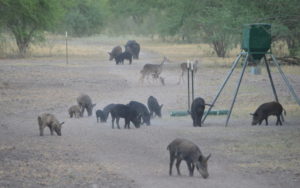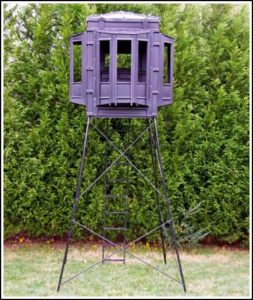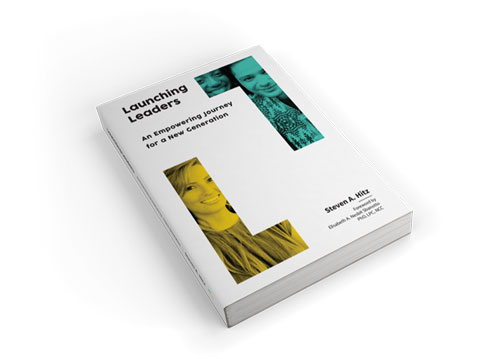Some of my relatives have had a practice of traveling from Colorado to south Texas each year to “Hunt” pigs. The hunt goes something like this; they arrive at the dude ranch where they freshen up and are fed like kings. Before dusk, they are taken to fully functional tree stands, complete with special comfy chairs, treats, and such. They climb up into the tree stand and position themselves to view the pigs.
A feed truck or feeder bins below spread corn or feed and when the pigs come out from the bush to feast, they are plucked off, like shooting fish in a barrel. This is what they call a “pig hunt”.
Turns out that pigs are very smart creatures. In recent years, they have learned to stay in the bush until after dark before making a run for the food. To keep up with this, the “hunters” have purchased night vision scopes and special lighting that comes on when the pigs are at the feeding station. The lights are a certain color (I’m told that pigs are color blind to red and green), and when the lights are tripped, the hunters take aim through their night vision scopes and get their prey.
In an attempt to make some humane sense of this, I’m also told that these pigs are such a nuisance to the local farmers and ranchers, that they can ’t keep up with their procreation and that these types of activities are welcome and legal. Apparently the hunters claim this activity is helping the balance of protecting the earth and managing wildlife.
’t keep up with their procreation and that these types of activities are welcome and legal. Apparently the hunters claim this activity is helping the balance of protecting the earth and managing wildlife.
My heart is of a different ilk. My philosophy and that of my relatives who go on the pig hunts are decidedly different. We can go back and forth for hours, making valid points on each side, respectfully. At this point in time, they are not swayed, and I am not either.
The point of telling this story is not to challenge my relatives pig hunting philosophy but it is to ask the question—using the pig hunt as an analogy, “Have our abundant lives become way too comfortable?” If the manna from heaven is figuratively placed at our doorstep every day, and we can simply get in the habit of opening our door and partaking. Sooner or later our life style is challenged, and we adjust—like the pigs retreating back into the bush to come out in darkness. We get comfortable again, and sure enough, there are new challenges to our abundant life.
There are a few lessons we might learn from this pig story analogy that can increase our wisdom:
- Understand the source of our blessings—-don’t just assume the solutions to our survival will always be there when we need them, and try to gain insights as to the bigger picture. Usually we are blessed so that we might help another too (my opinion). If we understand the source of our blessings, it’s easier to recognize the picture is often much larger than ourselves. If we become greedy in our taking, we might end like the pigs feasting on the corn row in Texas.
- Be careful in your comfort—try to always live in a state of gratitude. Don’t be prideful in abundance. Part of the pride might be the temptation to take credit for your well-being—forgetting that no one succeeds alone.
- Don’t always assume that something placed before you to partake of is always the right thing to do. Sometimes good meditation and pondering can help sift good opportunities from those not so good—or even bad.
- Don’t sacrifice your well-being for a good meal. Making your way to the buffet, especially when you are hungry, is natural; but is it always wise.
I’m not talking about applying these lessons for just temporal things; perhaps more important is to be wise in these lessons pertaining to emotional and spiritual things.
The pigs in Texas have figured out ways to adjust; but not without great loss. We can observe the lessons learned and make adjustments way before it becomes perilous to our souls by considering these four points mentioned above. There are many other lessons to be gleaned from this story; all will make us wiser as we consider both the blessings and challenges of abundance.






